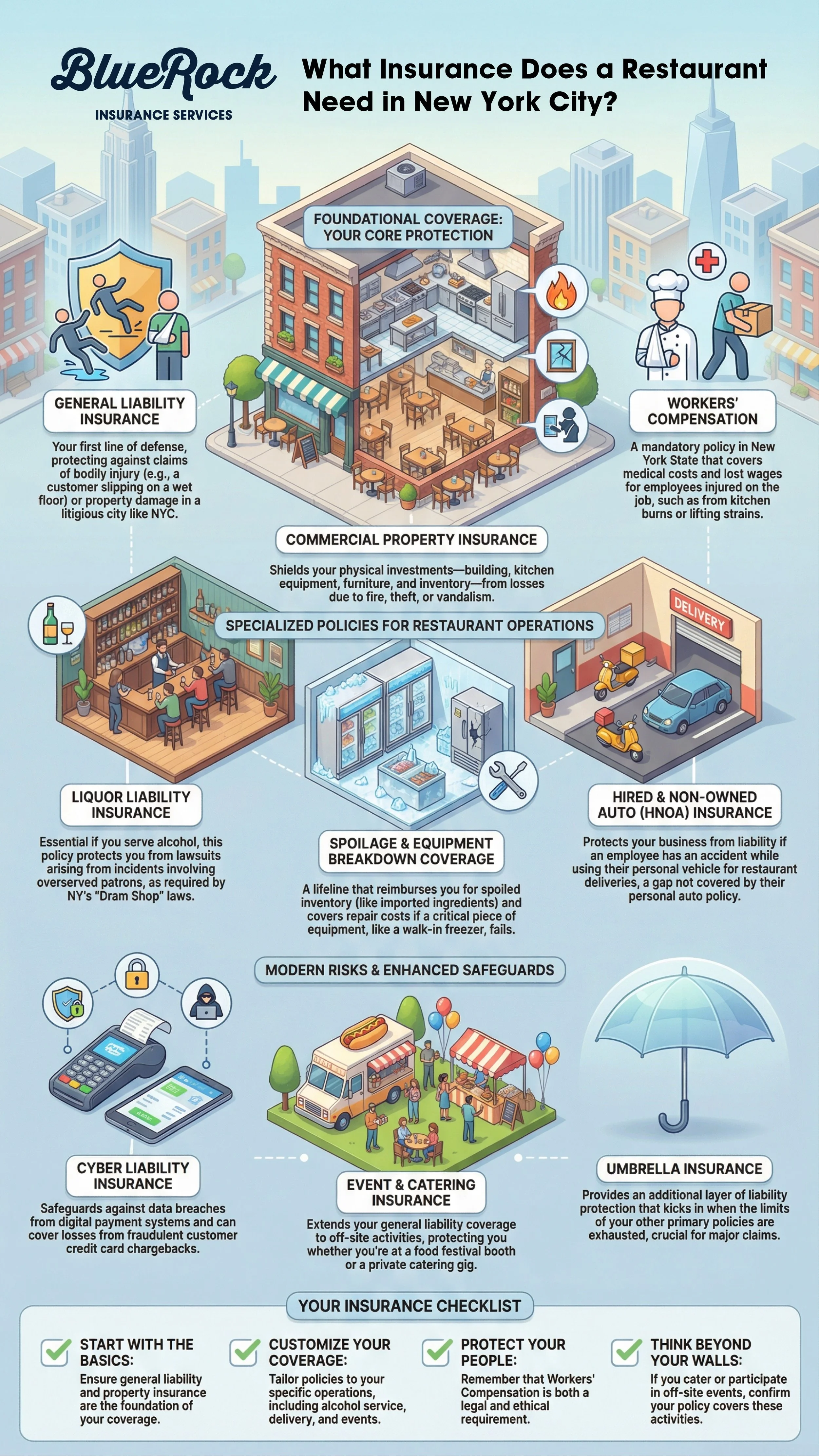Understanding New York Restaurant Insurance Needs
Running a restaurant in New York comes with unique challenges. Insurance is a crucial part of managing these challenges. New York restaurant insurance protects against various risks, from property damage to liability claims. Understanding the types of coverage available is essential for restaurant owners. It helps in making informed decisions.
Effective restaurant risk management involves more than just buying insurance. It requires identifying potential risks and implementing safety protocols. This guide will help you navigate the complexities of restaurant insurance in New York. It aims to provide clarity and peace of mind.
Why Restaurant Insurance is Essential in New York?
Running a restaurant in New York is both thrilling and demanding. The unique risks and dense population increase the need for comprehensive insurance. Restaurant insurance shields your business from unexpected setbacks. It protects against various challenges, from minor incidents to major disruptions.
Consider these vital reasons for insurance coverage:
Safeguards against property damages like fires and theft.
Covers liability claims from customer injuries or illnesses.
Ensures business continuity during unforeseen interruptions.
Legal requirements also drive the need for insurance. Compliance helps avoid fines and legal issues. Investing in the right insurance brings peace of mind. It allows you to focus on delivering a great dining experience.
Key Types of Restaurant Insurance Coverage
Understanding the different types of restaurant insurance is crucial. It helps protect your New York restaurant from varied risks and liabilities. Several key insurance types are available. Each serves a specific purpose essential for safeguarding your business.
Here’s a rundown of major coverage types:
Restaurant Liability Insurance: Covers customer claims like slip-and-fall accidents.
Property Insurance: Protects against fire, vandalism, and natural events.
Business Interruption Insurance: Compensates for lost revenue during closures.
Workers’ Compensation Insurance: Necessary for employee injuries at work.
Liquor Liability Insurance: Required if serving alcohol, covering alcohol-related incidents.
Cyber Liability Insurance: Increasingly important for digital transactions security.
Choosing the right mix requires careful consideration. Analyze your restaurant's specific needs and risks. The right coverage strategy provides solid protection. Regular reviews ensure your policy keeps pace with changes.
Restaurant Liability Insurance
Restaurant liability insurance is paramount. It protects against lawsuits from various customer-related incidents. Such incidents can include slip-and-fall accidents. Even a simple puddle can lead to costly claims.
Coverage often includes:
Injury claims from accidents on premises.
Illnesses resulting from foodborne pathogens.
Legal fees and settlement costs.
Ensure your policy covers these vital areas. Tailor coverage to fit your restaurant’s unique risks. Neglecting liability insurance exposes you to significant financial threats. Comprehensive coverage is your best safeguard.
Property and Business Interruption Insurance
Property insurance protects your physical assets. It covers damages from fires, natural disasters, and vandalism. This coverage is crucial for maintaining operations. Without it, repair costs could significantly impact your budget.
Business interruption insurance complements property coverage. It provides income during temporary closures from covered events. This insurance helps sustain your business. It ensures continuity even during unforeseen disruptions.
Consider both types of insurance essential. They provide a safety net for operational stability. Review these policies regularly. This ensures your coverage matches your current assets and potential risks.
Workers’ Compensation and Employee Coverage
Workers’ compensation insurance is mandatory in New York. It covers medical expenses from job-related injuries. This insurance also provides disability benefits. Employees receive support while unable to work. Employee protection is crucial for compliance. It minimizes disputes and fosters a safe work environment.
Without this coverage, you face legal repercussions. Fines and lawsuits can quickly escalate costs. Employee insurance options extend beyond workers' compensation. Consider health and dental plans to attract talent. Investing in your workforce builds loyalty. Secure coverage is a step towards a committed team.
Liquor and Cyber Liability Insurance
Liquor liability insurance is vital for establishments serving alcohol. It covers claims stemming from alcohol-related incidents. This includes scenarios where alcohol service contributes to accidents or injuries. Crucial for bars, taverns, and restaurants alike. Cyber liability insurance is growing in importance. Digital transactions and data breaches pose new challenges.
Coverage may include:
Data breach response costs.
Notification expenses for affected customers.
Legal defense against privacy violations.
Evaluate your need for these insurances. Ensure you meet legal and operational requirements.
The right coverage protects against evolving risks. Stay proactive in securing your digital and alcohol-related liabilities.
Restaurant Insurance in NYC: Unique Considerations
Operating in New York City presents unique challenges. These affect your restaurant insurance needs. New York City's environment can heighten certain risks. Legal and regulatory demands vary significantly from other locations.
Consider these unique NYC factors:
Dense urban setting: Increases the risk of property and liability claims.
High foot traffic: Requires robust liability protection.
Stringent regulations: Demands careful compliance with local laws.
Addressing these considerations is crucial. Align your insurance policies with NYC's distinct requirements. Engage with brokers who understand the local market. Tailored advice ensures comprehensive protection for your business.
Restaurant Risk Management Strategies
Effective risk management is crucial for any restaurant. It reduces potential threats and enhances safety. Start by identifying possible risks. This step is essential for preparing appropriate responses. Implementing safety protocols is another key component. Ensure all staff are trained regularly.
Consider these strategies:
Regular equipment maintenance: Prevents breakdowns and hazards.
Health and safety standards: Keeps everyone safe, including patrons.
Monitoring incidents: Aids in identifying patterns and addressing issues.
Maintaining these strategies keeps risks low. It also promotes a secure environment for your restaurant.
How to Choose the Right Insurance Policy?
Selecting the right insurance policy is crucial for your restaurant's future. Consider factors unique to your business needs.
Think about these essential steps when choosing:
Identify coverage needs: Assess risks specific to your location and type of cuisine.
Compare policy options: Evaluate different insurers and their offerings.
Consult experts: Work with an insurance broker with industry experience.
Regularly review your policies as your business grows. Make sure coverage fits any new risks or expansions. This approach ensures you remain protected.
Key Takeaway
Restaurant insurance in New York protects against property damage, liability claims, and business interruptions.
Essential coverages include General Liability, Property, Workers’ Compensation, Business Interruption, Liquor Liability, and Cyber Liability Insurance.
NYC restaurants face unique risks due to high foot traffic, strict regulations, and dense urban settings.
Tailoring coverage to your restaurant’s size, location, and operations ensures better protection.
Regularly review and update policies to stay compliant and prepared for evolving risks.
The right insurance strategy builds trust, financial stability, and long-term success.
Frequently Asked Questions About New York Restaurant Insurance
Understanding New York restaurant insurance can be complex. Common questions often include: What coverage is legally required? How do costs vary by location?
Answering these questions helps restaurant owners make informed decisions. Clarify these details to avoid potential pitfalls and ensure comprehensive protection.




